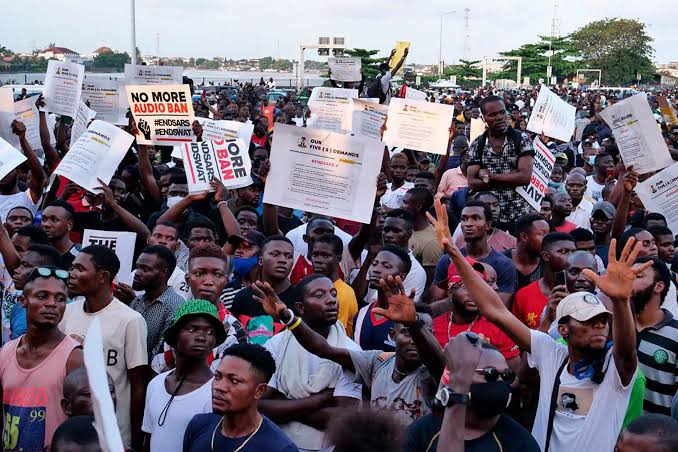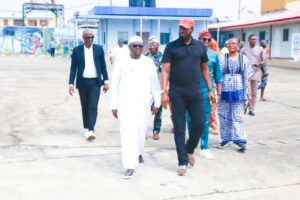The protests, which began on Thursday, recorded widespread destruction of lives and properties, particularly, in the northern part of the country, including the Federal Capital Territory(FCT), Abuja, after the protests were hijacked by irate youths in some northern states.
However, in the Eastern and the Western parts of the country, our correspondents gathered that most businesses closed shops for fear of hoodlum’s attack, hence, couldn’t conduct their daily routine operations, thereby, losing several over a trillion Naira in the process.
Most sectors affected include: trade and commerce, manufacturing, entertainment, transportation, logistics, financial services, hospitality industry, agriculture, aviation, ICT, and construction sectors, SMEs, among others.
Earlier, the Centre for the Promotion of Public Enterprise (CPPE) has estimated that the planned nationwide protest could lead to a daily loss of N400 billion if not properly managed.
The chief executive officer (CEO) of the Center, Dr. Muda Yusuf had earlier warned that, the proposed nationwide protests portend grave dangers for an economy which is already in a very fragile state, adding that, the consequences of such a huge loss for the country and the citizens would be very severe.
As predicted, the pockets of crisis that greeted the protest as well as the impact of apprehension on business operations are now becoming an economic threat to economic actors in the country.
On its part, the National Association of Small Business Owners of Nigeria (ASBON) and National Association of Small Scale industrialists(NASSI), cited low market penetration and estimated loss of revenue as consequences of the protests.
Speaking on this development, national president Association of Small Business Owners of Nigeria (ASBON) Dr. Femi Egbesola said, although the protesters are lawfully engaging in their civil rights to demand for a better living conditions, he urged the government to address the economic fallouts affecting the state of the economy.
Egbesola said, the current inflation and exchange rate had created a precarious economy for manufacturers, industrialist and SMEs in the country even as he said multinationals were exiting from the country because of the market forces beyond their control.
He, however urged government to administer the right economic policy to tame inflation and regulate price control for business activities to operate seamlessly.
The national vice president of the Nigerian Association of Small-Scale Industrialists, Segun Kuti-George, said the fear of arson from the EndSARS protest still haunts Nigerian business owners who almost lost their factories.
Our factories were nearly torched and we would have been without businesses, Kuti-George recounted the joint experiences of business owners in the EndSARS protest.
In addition to the Nigerian political class, which has appealed to the sensibilities of protesters calling for calm and security agencies, which have warned against violence, business stakeholders have stated their desire for peaceful demonstrations.
According to the NASSI Vice President, more Nigerians are restricting their movements on the days of the planned protests, leading to a drop in foot traffic, which means a slower business day.
Also, a development economist, Rotimi Oyelere, pointed out that, there is a loss of output and income when protests force workers to stop working, adding that, protests of a nationwide magnitude could have a multiplier effect on daily wage earners.
“There will be a micro impact in immediate income loss for households, and businesses, then a macro impact that will affect general output and on a national aspect. It could get out of control and lead to indirect loss if there is a need to restore any destroyed property,” he added.
The economist recommended more transparency between the people and the state, noting that, a deterioration of trust helped ignite the brewing social unrest in the country.
Earlier, Dr Muda Yusuf, suggested that, the protesters considered that over 90 per cent of employed Nigerians are in the informal sector.
“Employees in this space (informal sector) depend on daily income and any disruption to their economic activities beyond 24 hours could snowball into major social unrest. This underlines the country’s vulnerability to prolonged protests,” he said.
According to him, “Trade costs are still prohibitive and needs to be drastically reduced across board in a manner that would not undermine domestic production. High cargo clearing cost is a major factor driving inflation which needs to fixed urgently.
“Revenue drive should be managed in a manner that does not impose additional pressures on citizens and corporate bodies. There is also an urgent need to prioritize fiscal frugality and transparency in public sector in all tiers and across all levels of government coupled with appropriate signaling and messaging that reflect current economic conditions. These are essential to earn the confidence of the generality of the people.”
Meanwhile, #FixPolitics has said, the federal government’s reactions to the #EndBadGovernmence peaceful protest shows serious disconnect with the people it was elected to govern,
In a statement entitled ‘August 1, 2024 Citizens Peaceful Protest: Time to Change Course’, the citizen-led movement faulted government’s reactionary and ill-advised actions to give the protest and the protesters a bad name.
The executive director, #FixPolitics Africa, Anthony Ubani, said government’s reaction and provocative utterances about the protests reflected a deep disconnect with the people’s reality.
He faulted the government’s attempt to demonise the valid demands of the hungry populace and brand it the work of opposition parties.
According to him, searching for imaginary sponsors of the protests only bolstered the courage of the people, who fear the loss of their voices and dignity in an oligarchy in the garb of a democracy.
Ubani said the Office Of The Citizen is the highest in a democracy, adding, “to make it impossible for citizens to express themselves or criminalise their right to free assembly in peaceful protest is an unacceptable descent into dictatorship.
“Peaceful protests are a constitutionally protected right of citizens and the rational response from a democratic and well-meaning government would have been a call for national dialogue, and more importantly, a commitment to definite actions to be implemented in the next few weeks. It is not too late for President Bola Tinubu administration to allow citizens to freely express their disagreement with government’s policies and programmes through peaceful protests.”
He noted that the determination of citizens to execute the protests peacefully from August 1 to 10, 2024 reflects the failure of the government’s underhand and patronising tactics to placate the people.
“It is now the responsibility of the government to ensure the security of the protesters, stop criminal elements from hijacking the protest and, more importantly, create opportunities to listen to the citizens.
“To act otherwise will be tragic. Painful memories of #EndSARS still linger. The world is watching and citizens are no longer docile. We, therefore, make bold to state in precise terms that the authoritarian and intolerant reflex that characterised the government’s statements and actions in the build-up to the protest has no place in a democratic country,” he said.
Ubani said, the protests provided the opportunity for the government to rethink its actions of the past 14 months and make the needed changes, stating that “the pain, suffering and hardship in Nigeria are real and cannot be politicised. The government should eat the humble pie and urgently go back to the drawing board to initiate new people-centred policies to ameliorate the pain and anger across Nigeria.”
In the same vein, Nigerian telecom providers have made it clear that cable cuts by hoodlums of #EndBadGovernance Protests, are to blame for the country’s network outages.
The explanation follows claims made by certain organizations that network providers, such as MTN Group Limited, interfered with the network to restrict coverage of the country’s #EndBadGovernance demonstrations.
Recall that NetBlocks, a watchdog organisation that monitors cybersecurity and internet governance, revealed that a disruption to leading internet provider MTN in #Nigeria may limit the visibility of #EndBadGovernanceInNigeria protests.
To this end, a coalition, made up of about 37 organizations had stated that they condemned the intentional disruption of access to the internet in Nigeria following protests that erupted in several states across the country on the 1st of August, 2024.
The coalition is made up of organizations like Accountability Lab Nigeria; Africa Cybersecurity Alliance; Africa Media and Information Technology Initiative (AfriMITI); African Academic Network on Internet Policy (
AANOIP.ORG); African Centre for Media & Information Literacy (AFRICMIL); Afroleadership Cameroon; BONews Service; Brain Builders Youth Development Initiative; Bridges and Hands Foundation; Centre for Journalism Innovation and Development (CJID); FactCheck Africa Initiative; National Roundtable on Business and Human Rights and Paradigm Initiative, among others.
In a press statement, the coalition said, “We, the undersigned organisations, in the strongest terms possible, condemn the intentional disruption of access to the internet in Nigeria following protests that erupted in several states across the country on the 1st of August, 2024. This action constitutes an unacceptable breach of established norms and standards under regional and international human rights instruments to which Nigeria is a State party and must be halted forthwith.

“We call on relevant agencies of the government to respect citizens’ rights and immediately cease further disruptions of network services and attempts at future network shutdowns.”
Meanwhile, operators have stated that the internet disruption is a result of cable cuts by hoodlums during the #EndBadGovernance Protests.
Speaking on behalf of operators in Nigeria, the executive secretary, Association of Licensed Telecommunications Operators of Nigeria (ALTON), Mr Gbolahan Awonuga, said that the network outage was caused by demonstrators damaging some internet cables.
“There are a lot of cable cuts across Nigeria. Some of the protesters went into the manhole and cut the cables. The network disruption is not a matter of the government trying to sabotage the protest. It is as a result of the cable cut,” he explained.











